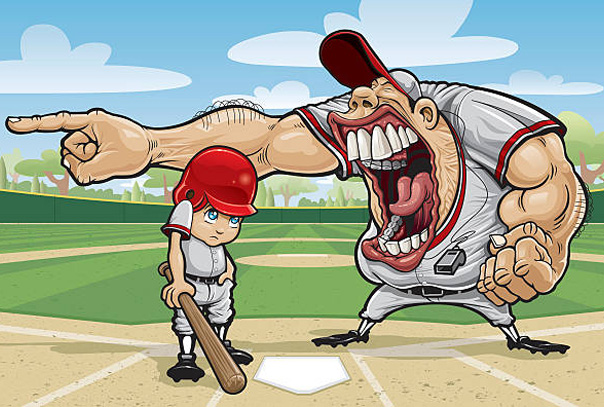 Most of us have been competing since leaving the cradle, and we sense that we should continue to compete when our playing days are over. We love the game. We feel more complete when we are involved in the game. We feel energized and motivated when we battle an opponent. As a result, coaching is the route many of us take to stay in the game we love and to satisfy that urge to compete. I’ve often said that coaching is not just a profession, it’s a calling.
Most of us have been competing since leaving the cradle, and we sense that we should continue to compete when our playing days are over. We love the game. We feel more complete when we are involved in the game. We feel energized and motivated when we battle an opponent. As a result, coaching is the route many of us take to stay in the game we love and to satisfy that urge to compete. I’ve often said that coaching is not just a profession, it’s a calling.
But, does coaching bring out the best in you or the worst in you?
I scheduled a non-conference game one year early in my coaching career because the coach on the opposing team was one of the nicest baseball guys I had ever met. I thought it would be fun to compete against his team and see how he coached and interacted with his players. We started the “home and home” series on his campus. When we arrived, the coach was his normal, congenial self. He was focused and engaged during batting practice and infield/outfield drills. While exchanging lineup cards and going over the ground rules with the umpires, I noticed that he seemed agitated and a bit tight. During the first inning, it was obvious that he had transformed into an incredibly intense, high-strung coach. It was war to him. While coaching third base, his face would become red and the veins protruded from his neck each time he chirped about balls and strikes from the umpire. By the third inning it wasn’t just war, it was nuclear war. Coaching brought out the worst in my friend. It brought out the worst in me sometimes, too.
To prevent coaching from bringing out the worst in us, it’s good to remember why we coach. Here is a list of five basics that may help us to stay centered on our purpose in coaching.
- One of a coach’s primary responsibilities is to help the athletes we coach develop their skills so that they can become the best their ability allows them to be.
- Teach players how to compete at the highest level while at the same time, respecting the game and competing with integrity.
- Continue to develop as a coach and increase knowledge and communication skills to teach the fundamentals of the game at a high level. The more knowledge a coach has, the more confident he will be. With knowledge and confidence, players will trust a coach.
- Excel as a role model. Model exceptional behavior as a competitor. This should be a top priority. None of us are perfect, but when we set the bar high, we can all get better. Don’t just tell players how to conduct themselves on and off the field—show them. Be the role model for your players that you needed when you were young. John Wooden once said, “Being a role model is the most powerful form of educating.”
- Leave a legacy of pouring great baseball knowledge, values, and selflessness into your players. The more you give to them, the more you will receive: effort, gratitude, and life-long relationships. Peter Strople has said, “Legacy is not leaving something for people. It’s leaving something in people.”
We are all a work in progress. We all have room to grow in knowledge, being a positive role model and in the role of being a competitive, inspiring coach.
One of the best gifts a coach can give himself is the gift of self-appraisal. Ask yourself the hard questions: “am I preparing well enough, am I connecting with the players on our team, am I exuding confidence and self-control?” If a coach is out of control, the team is suddenly void of a leader. It’s great to be passionate, energetic, and competitive, but when a coach transitions into “out of control mode” he coaches with one arm tied behind his back.
Another way a coach can grow from self-appraisal is to find the balance between confidence and arrogance. Looking in the mirror is not the place you want to be while singing the old hymn, “How Great Thou Art!” An inflated ego makes a coach less approachable to the players and is a turnoff to everyone, especially umpires. Be confident, be competitive, but check your ego at the door exiting your locker room.
It is impressive to see a leader or a coach exuding both great confidence and humility. I’m reminded of a great parable taught by Jesus in Luke 14:8-14: “When someone invites you to a wedding feast, do not take the place of honor, for a person more distinguished than you may have been invited. If so, the host who invited both of you will come and say to you, ‘Give this man your seat.’ Then humiliated, you will have to take the least important place. But when you are invited, take the lowest place, so that when your host comes, he will say to you, ‘Friend, move up to a better place.’ Then you will be honored in the presence of all your fellow guests. For everyone who exalts himself will be humbled, and he who humbles himself will be exalted.”